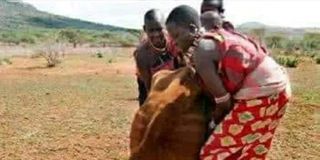Disaster as over 60,000 families face starvation in Kajiado

A family from Matapato North area in Kajiado Central sub county try to lift up a skinny-drought-hit cow on Monday, August 29,2022.
More than 60,000 families, or about 500,000 individuals, and at least 450,000 cattle in Kajiado County are facing starvation due to the ongoing simmering drought.
The creeping disaster has prompted county officials and the national government to convene a crisis meeting, called "unity against hunger", with more than 15 local and international humanitarian, food security and conservation stakeholders in Kajiado town yesterday.
Elected leaders set aside their political differences after the recent elections to address the needs of residents.
The vast county has not received adequate rainfall in the last two years, causing a raging drought especially in Kajiado Central, Kajiado East and Kajiado West sub-counties.
Pasture is long gone and seasonal rivers are dry. Most herders have relocated to neighbouring counties in search of fast diminishing pasture. Human-wildlife conflict is rife.
A recent county survey showed that at least 450,000 cattle valued at about Sh13.6 billion were on the verge of death, with 75 percent of wildlife affected and dying of hunger.
Dozens of domestic animals are said to have succumbed in the last three months. A mature skinny cow now fetches less than Sh5,000 at the Il Bisil livestock market.
During the meeting, Kajiado Governor Joseph Ole Lenku said the county government had set aside Sh130 million from the emergency kitty to address the effects of drought.
The money will be supplemented by donations from stakeholders and the cash transfer programme run by the national government.
"We have released Sh130 million from the emergency kitty. We are reaching out to non-state actors to step in to help our people. The drought situation in our partly semi-arid county is past the red alert. We need a rescue," said Governor Lenku at the meeting.
To avoid human deaths from hunger and mass livestock deaths, the stakeholders have taken short-term measures, including providing relief food to vulnerable persons at Sh1,400 per month for the next three months and supplementary feeding for children under the age of five and breastfeeding mothers.
"We have come up with a well elaborated network on how we will be able to reach vulnerable people in both rural and urban centres. It’s our prayer no one will die out of hunger," he added.
The drought emergency kitty will also support 280,000 schoolchildren with supplementary food and dietary rations for Sh16 per child a day for the next three months.
Herders will also benefit from free livestock feed supplements, provision of hay, and rehabilitation and solarisation of community boreholes.

Carcass of a cow that has succumbed to drought at Matapato North area, in Kajiado County.
"We have the data of the people greatly affected by the drought. We have also profiled areas with no pasture for livestock. The national government in collaboration with the county government and other stakeholders are moving in earnest to safe the situation," said Kajiado County Commissioner Wilson Wanyanga,
Human-wildlife conflict
Wildlife conservators said current human-wildlife conflicts are caused by scarcity of water and pasture for wild animals in the Amboseli, Chyulu and Tsavo East national parks and in dozens of private wildlife sanctuaries, prompting animals to roam to private lands.
"The drought has extended into animal parks, prompting animals to stray in search of water and fodder. We have reached out to Kenya Wildlife Service (KWS) management and other stakeholders to intervene," said Leyian Ntoyian, the CEO of the Big Life Foundation, a wildlife conservation trust.
In the long-term, stakeholders will work with the county government to help herders diversify from cattle rearing to agribusiness that will depend on rain-harvested water through irrigation instead of relying on rainfall.
"We will put up stringent measures to ensure our people harvest rainwater for irrigation agribusiness,” Governor Lenku added.
“We want our people to diversify into modern farming instead of depending on livestock rearing. The erratic climate change has made cattle rearing untenable.”





